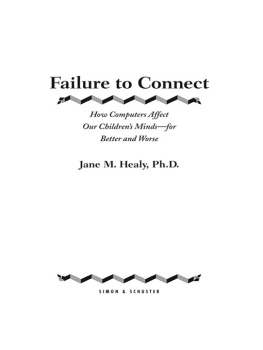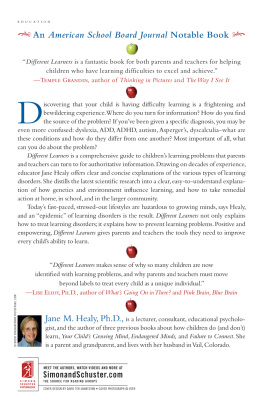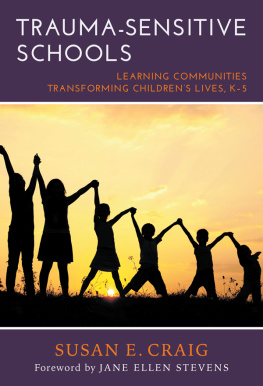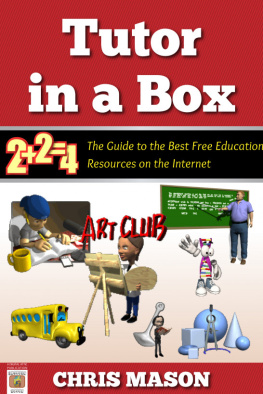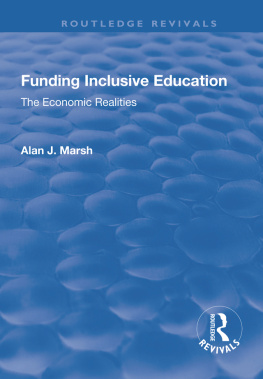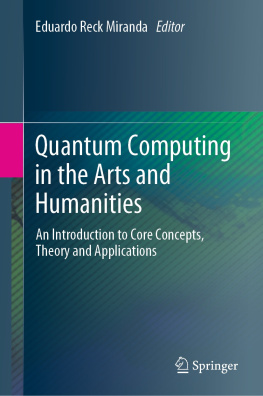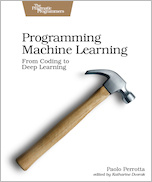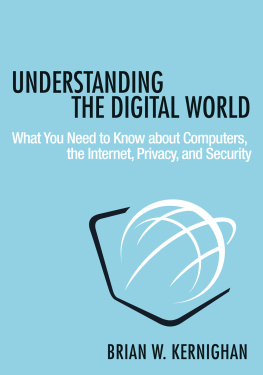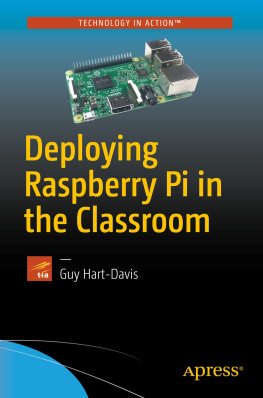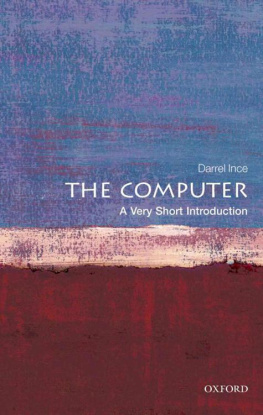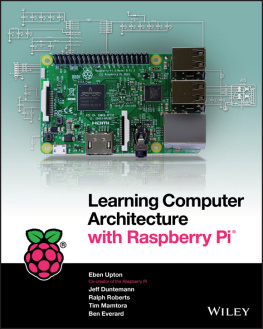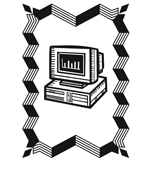Jane M. Healy - Failure to Connect: How Computers Affect Our Childrens Minds—For Better and Worse
Here you can read online Jane M. Healy - Failure to Connect: How Computers Affect Our Childrens Minds—For Better and Worse full text of the book (entire story) in english for free. Download pdf and epub, get meaning, cover and reviews about this ebook. year: 1999, publisher: Simon & Schuster, genre: Home and family. Description of the work, (preface) as well as reviews are available. Best literature library LitArk.com created for fans of good reading and offers a wide selection of genres:
Romance novel
Science fiction
Adventure
Detective
Science
History
Home and family
Prose
Art
Politics
Computer
Non-fiction
Religion
Business
Children
Humor
Choose a favorite category and find really read worthwhile books. Enjoy immersion in the world of imagination, feel the emotions of the characters or learn something new for yourself, make an fascinating discovery.
- Book:Failure to Connect: How Computers Affect Our Childrens Minds—For Better and Worse
- Author:
- Publisher:Simon & Schuster
- Genre:
- Year:1999
- Rating:5 / 5
- Favourites:Add to favourites
- Your mark:
Failure to Connect: How Computers Affect Our Childrens Minds—For Better and Worse: summary, description and annotation
We offer to read an annotation, description, summary or preface (depends on what the author of the book "Failure to Connect: How Computers Affect Our Childrens Minds—For Better and Worse" wrote himself). If you haven't found the necessary information about the book — write in the comments, we will try to find it.
In this comprehensive, practical, and unsettling look at computers in childrens lives, Jane M. Healy, Ph.D., questions whether computers are really helping or harming childrens development. Once a bedazzled enthusiast of educational computing but now a troubled skeptic, Dr. Healy examines the advantages and drawbacks of computer use for kids at home and school, exploring its effects on childrens health, creativity, brain development, and social and emotional growth.
Today, the Federal Government allocates scarce educational funding to wire every classroom to the Internet, software companies churn out educational computer programs even for preschoolers, and school administrators cut funding and space for books, the arts, and physical education to make room for new computer hardware. It is past the time to address these issues. Many parents and even some educators have been sold on the idea that computer literacy is as important as reading and math. Those who havent hopped on the techno bandwagon are left wondering whether they are shortchanging their childrens education or their students futures. Few people stop to consider that computers, used incorrectly, may do far more harm than good.
New technologies can be valuable educational tools when used in age-appropriate ways by properly trained teachers. But too often schools budget insufficiently for teacher training and technical support. Likewise, studies suggest that few parents know how to properly assist childrens computer learning; much computer time at home may be wasted time, drawing children away from other developmentally important activities such as reading, hobbies, or creative play. Moreover, Dr. Healy finds that much so-called learning software is more edutainment than educational, teaching students more about impulsively pointing and clicking for some trivial goal than about how to think, to communicate, to imagine, or to solve problems. Some software, used without careful supervision, may also have the potential to interrupt a childs internal motivation to learn.
Failure to Connect is the first book to link childrens technology use to important new findings about stages of child development and brain maturation, which are clearly explained throughout. It illustrates, through dozens of concrete examples and guidelines, how computers can be used successfully with children of different age groups as supplements to classroom curricula, as research tools, or in family projects. Dr. Healy issues strong warnings, however, against too early computer use, recommending little or no exposure before age seven, when the brain is primed to take on more abstract challenges. She also lists resources for reliable reviews of child-oriented software, suggests questions parents should ask when their children are using computers in school, and discusses when and how to manage computer use at home. Finally, she offers a thoughtful look at the question of which skills todays children will really need for success in a technological future -- and how they may best acquire them.
Based on years of research into learning and hundreds of hours of interviews and observations with school administrators, teachers, parents, and students, Failure to Connect is a timely and eye-opening examination of the central questions we must confront as technology increasingly influences the way we educate our children.
Jane M. Healy: author's other books
Who wrote Failure to Connect: How Computers Affect Our Childrens Minds—For Better and Worse? Find out the surname, the name of the author of the book and a list of all author's works by series.

